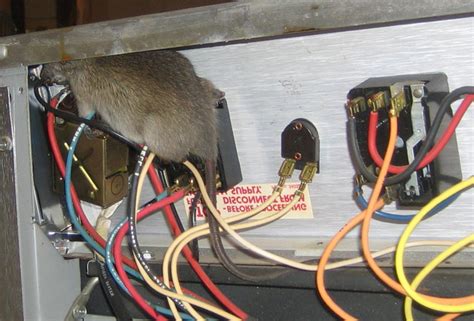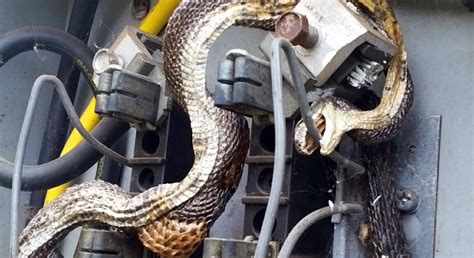animals damaging electrical box Protect your home and prevent electrical hazards! Learn how rats, mice, and other wildlife can cause electrical problems and keep your home safe. One of the most difficult aspects of reporting IRA and retirement plan distributions is determining the proper distribution code(s) to enter in Box 7 on IRS Form 1099-R. We’ve called out each distribution code that may apply and explained when to use each.
0 · why do rodents chew electrical cables
1 · snakes in electrical boxes
2 · rodents chewing on electrical panels
3 · rodent damage to electrical system
4 · rats and mice electrical problems
5 · how to prevent rodent damage electrical work
6 · electrical control panel pest damage
7 · damage to electrical controls
A junction box, often referred to as a ‘j box’ or ‘j-box’, is a protective enclosure that houses electrical connections. Its primary purpose is to enclose and protect all the wire splices where the wires are joined together.
why do rodents chew electrical cables
Most electrical workers with some experience know that pests can quickly infiltrate and destroy electrical components inside control enclosures. Pests .In addition to being a health hazard to your family, rodents love to chew and seem to have a particular penchant for the insulation on your electrical work, which can damage your home . Protect your home and prevent electrical hazards! Learn how rats, mice, and other wildlife can cause electrical problems and keep your home safe. Rodents chewing through electrical wires pose a significant fire hazard. Signs of wire damage, such as power outages and frayed wires, should be promptly addressed. Rodents using electrical wiring as nesting material .
Birds are nesting, squirrels are foraging, gophers are burrowing – which can all be bad news for your home’s electrical equipment! Every year, our Ting Fire Safety Team assists . Wiring damage and related fire potential can be hidden behind walls and under attic insulation. In fact, experts suspect that rodents are the culprits in one-fourth of all fires that start without known causes. Rodents also chew the .
external electrical fuse box
You can cover wires with a specially formulated antirodent electrical tape that is capsaicin infused and repels mice with its spicy taste. Additionally, you can seal the wiring in a thin coating of concrete, as the mice . Power failures are common when rodent infestations are damaging your home’s electrical system. If you notice electrical problems, start looking for signs of rodents. But you should also be proactive and monitor your .Rodents chewing on electrical wires can bring you a world of frustration at the minimum, but can be a source of serious harm at worst! An infestation left unchecked can cause: Permanent . When rodents have access to electrical wiring that is exposed and not enclosed in hard plastic or sheet metal casings, their incessant chewing can result in a house fire. Loose wiring in attics, crawlspaces, and walls are all vulnerable to rodent damage.

Most electrical workers with some experience know that pests can quickly infiltrate and destroy electrical components inside control enclosures. Pests such as rats, snakes, and small insects will take over a control-housing unit because it provides .In addition to being a health hazard to your family, rodents love to chew and seem to have a particular penchant for the insulation on your electrical work, which can damage your home systems and even cause a fire. Read on for tips on how to prevent these furry pests. Watch Out for the Telltale Signs of Rats.
Protect your home and prevent electrical hazards! Learn how rats, mice, and other wildlife can cause electrical problems and keep your home safe. Rodents chewing through electrical wires pose a significant fire hazard. Signs of wire damage, such as power outages and frayed wires, should be promptly addressed. Rodents using electrical wiring as nesting material increases the risk of fire. Birds are nesting, squirrels are foraging, gophers are burrowing – which can all be bad news for your home’s electrical equipment! Every year, our Ting Fire Safety Team assists many homeowners with electrical fire hazards caused by wild animals (most commonly squirrels). Wiring damage and related fire potential can be hidden behind walls and under attic insulation. In fact, experts suspect that rodents are the culprits in one-fourth of all fires that start without known causes. Rodents also chew the protective .
You can cover wires with a specially formulated antirodent electrical tape that is capsaicin infused and repels mice with its spicy taste. Additionally, you can seal the wiring in a thin coating of concrete, as the mice won't gnaw through the substance.
Power failures are common when rodent infestations are damaging your home’s electrical system. If you notice electrical problems, start looking for signs of rodents. But you should also be proactive and monitor your electrical wiring regularly to prevent problems.
Rodents chewing on electrical wires can bring you a world of frustration at the minimum, but can be a source of serious harm at worst! An infestation left unchecked can cause: Permanent appliance damage. Chewed up wires create an opportunity for power surges and arcing, both of which can do permanent harm to your appliances. Costly wire damage. When rodents have access to electrical wiring that is exposed and not enclosed in hard plastic or sheet metal casings, their incessant chewing can result in a house fire. Loose wiring in attics, crawlspaces, and walls are all vulnerable to rodent damage.Most electrical workers with some experience know that pests can quickly infiltrate and destroy electrical components inside control enclosures. Pests such as rats, snakes, and small insects will take over a control-housing unit because it provides .
snakes in electrical boxes
In addition to being a health hazard to your family, rodents love to chew and seem to have a particular penchant for the insulation on your electrical work, which can damage your home systems and even cause a fire. Read on for tips on how to prevent these furry pests. Watch Out for the Telltale Signs of Rats. Protect your home and prevent electrical hazards! Learn how rats, mice, and other wildlife can cause electrical problems and keep your home safe.
Rodents chewing through electrical wires pose a significant fire hazard. Signs of wire damage, such as power outages and frayed wires, should be promptly addressed. Rodents using electrical wiring as nesting material increases the risk of fire. Birds are nesting, squirrels are foraging, gophers are burrowing – which can all be bad news for your home’s electrical equipment! Every year, our Ting Fire Safety Team assists many homeowners with electrical fire hazards caused by wild animals (most commonly squirrels). Wiring damage and related fire potential can be hidden behind walls and under attic insulation. In fact, experts suspect that rodents are the culprits in one-fourth of all fires that start without known causes. Rodents also chew the protective . You can cover wires with a specially formulated antirodent electrical tape that is capsaicin infused and repels mice with its spicy taste. Additionally, you can seal the wiring in a thin coating of concrete, as the mice won't gnaw through the substance.
Power failures are common when rodent infestations are damaging your home’s electrical system. If you notice electrical problems, start looking for signs of rodents. But you should also be proactive and monitor your electrical wiring regularly to prevent problems.
rodents chewing on electrical panels
rodent damage to electrical system

A junction box is a protective enclosure where electrical wires meet to distribute power to your ceiling lights, outlets, switches, and appliances. This box protects connections to minimize the risk of sparking or overheating wires that can lead to fires, especially in spaces with insulation or other flammable materials.There is no efficient way to farm them but run maps as fast as you can. Seal or complete all your prophecies, buy 6 Bountiful Traps, roll Enraged Strongbox Monsters and Ambush on Vault, if .
animals damaging electrical box|snakes in electrical boxes